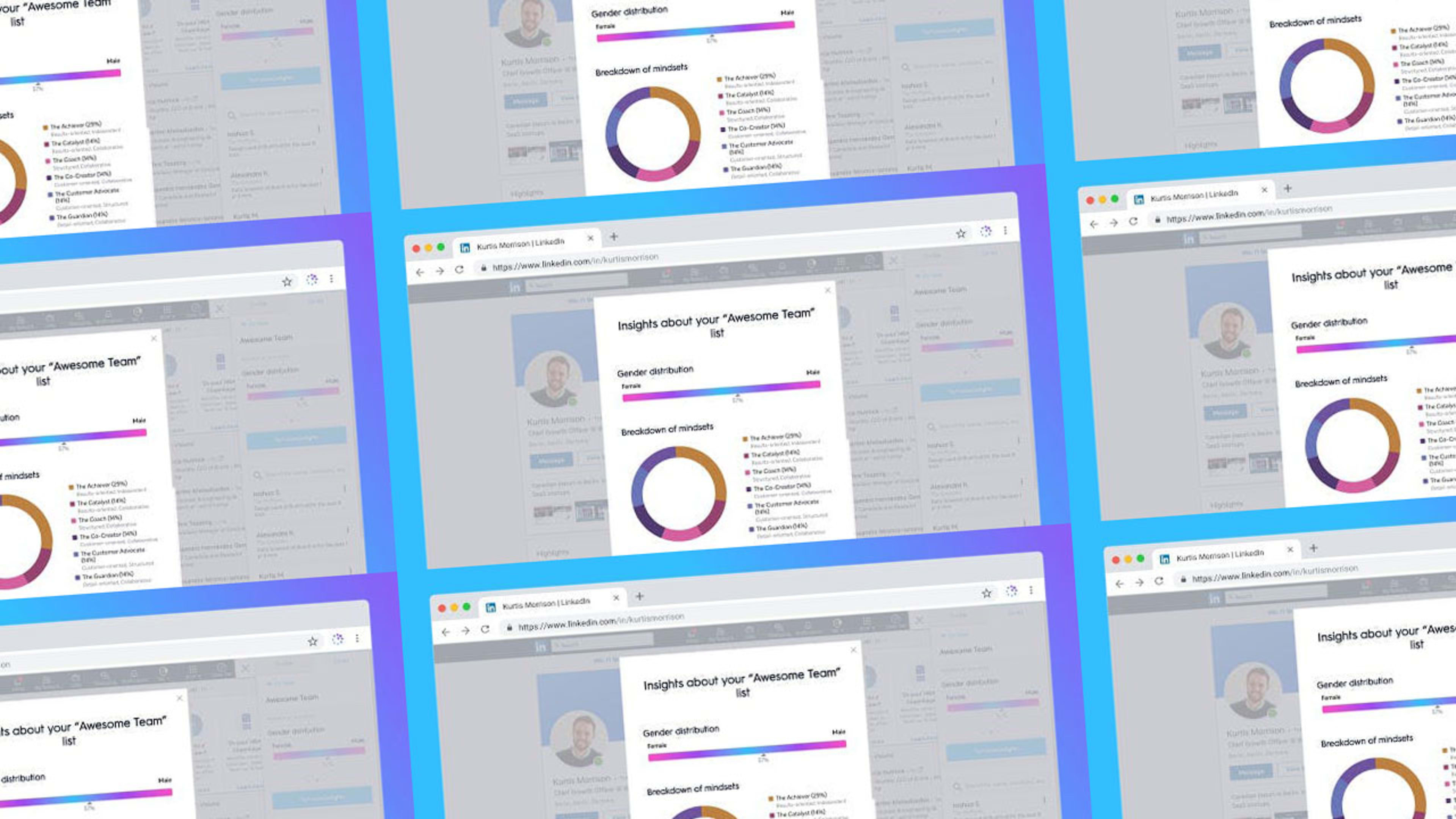Have you met Emma yet?
She’s a Chrome extension powered by artificial intelligence that analyzes anyone’s LinkedIn profile to get to know them in a single click. If you’re thinking, “Wow,” or “Creepy,” those are pretty much the reviews I got from friends and colleagues when they tried Emma.
Bunch.ai, a Berlin startup of organizational psychologists, data scientists, and software developers, built Emma to add a behavioral information layer to your LinkedIn profile.
She uses machine learning and a natural language processing algorithm to analyze your profile, posts, and recommendations. She then fits you into one of 14 behavioral types based on a model developed by Charles O’Reilly, PhD, an organizational behavior professor at the Stanford Graduate School of Business.

If you’re curious, you can add Emma to your Chrome browser, then open your LinkedIn profile, click the Emma icon in your browser bar, and check yourself out. It takes less than a minute.
First, Emma shares your type. My reviewers came up as “achievers,” “catalysts,” “customer advocates,” and “sages,” among other descriptors. Next, she describes you with adjectives such as “results-oriented” and “collaborative.” Then Emma identifies your strengths, weaknesses, ideal team type, and motivators.
I thought she described me well. I’m a “customer advocate” who focuses on creating value, appreciates feedback, and expects market-level compensation. Interestingly, my review panelists objected when Emma noted them as not motivated by money. While research has shown that money isn’t the top motivator on everyone’s list, they didn’t want Emma telling their next boss that, even though she’s probably right in many cases.
Finally, Emma tells you if her predictions should be fairly or highly accurate. She bases her estimate on the amount of information in your profile. She predicted that her accuracy for me would be high. It was. But one of the reviewers who disagreed with her report said that Emma also indicated a high accuracy for her.
Once you get over the shock of getting feedback about yourself from a mysterious algorithm, think about how Emma might help you. If you’re a job seeker, you can run your LinkedIn profile through Emma to learn how people perceive it. Several of my reviewers updated their profiles shortly after they received their assessments.
You can also assess potential colleagues’ strengths and weaknesses. Wouldn’t it be nice to know that your future boss is pragmatic but sometimes makes decisions without consulting others?
If you’re in recruiting mode, you can run Emma on candidates and get ideas for interview questions and how to make job offers, including pay. Darja Gutnick, one of Bunch.ai’s founders, explains that Emma lets recruiters expand their candidate pools beyond people who check the obvious boxes. Let’s say a recruiter is on the fence about calling you. They can run Emma and get an instant read on the potential that you’re a culture fit. That’s new and amazing. Recruiters don’t only find people; they build teams. So if you look like one of their missing pieces, you just moved from the “maybe call” to the “do call” list.
Over time, if you get the job and perform well, your new company might shift to include more people like you. There’s potential for transformation at scale if Emma succeeds in making hiring biases disappear.
Gutnick explains that Emma’s dataset includes the LinkedIn profiles of thousands of job applicants (the majority from the U.S., Europe, Asia, and Latin America; 55% male), as well as self-assessments they completed on the Bunch.ai platform., and an ever-expanding vocabulary derived from O’Reilly’s original work, the Harvard University dictionary, and expanded through user input. Bunch.ai tests and adjusts Emma’s algorithms each month to mitigate biases introduced by the dataset and continuous machine learning. Gutnick readily acknowledges bias inherent in the dataset, yet she also notes that Emma helps identify and provide insights about non-traditional candidates. And Emma doesn’t tell users to hire people or not.
Beyond the employment perspective, Gina Lavery, a coach who works with private equity executives, likes Emma’s potential to speed diagnostic and self-awareness processes in personal development programs. “Most of us wake up behind every morning. We must go faster,” she says, “That takes resilience, agility, and receptivity to coaching, which begins with self-awareness.” She also notes that Emma can help people understand their coworkers better.
One caveat: LinkedIn does not like extensions that scrape data from their system. Technically, that violates their terms and conditions. So control your use, turn Emma off when you don’t need her, and hope LinkedIn ignores you.
Whether the idea of people looking for more insight about you from your LinkedIn profile excites you or creeps you out, AI has arrived in our lives. What I like best about Emma is the transformational potential described above, and that she democratizes AI. So much of AI’s leverage resides with the powerful. Emma levels the field and gives all users information to make better decisions.
Donna Svei is an executive resume writer and former retained search consultant and C-level executive.
Recognize your brand’s excellence by applying to this year’s Brands That Matter Awards before the early-rate deadline, May 3.
